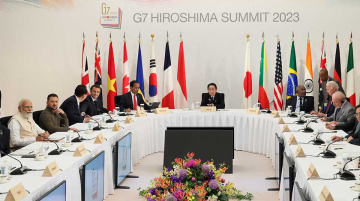This week, the prominent Financial Times commentator Gideon Rachman argued that the upcoming G7 summit in Cornwall could be ‘the west’s last chance to lead.’
He acknowledged that the seven rich democracies that make up the group (the U.S., U.K., France, Italy, Germany, Japan, and Canada) have seen a rapid loss in global economic influence. When they first met in 1975, the seven made up 80% of the world’s GDP. That share has now shrunk to 40%.
To bolster their influence, they’ve invited four other countries to Cornwall: the U.S. and Japan’s Quad buddies India and Australia, as well as South Korea and South Africa.
The latter is, as always, the odd one out. In the G20, SA always walks the uncomfortable line of tokenistically representing Africa, while trying to avoid coming off as wanting to lead Africa – long a sensitive issue between Pretoria and the rest of the continent. In Cornwall, SA’s token status will be even more glaring. Taking into account India’s role in the Quad, SA’s role almost becomes representing the entire Global South.
Rachman argues that for ‘the west’ [he seems to count Japan in those ranks] to regain its leadership from China, ‘the key question in Cornwall will be whether the G7 will be able to find other practical initiatives that go beyond feel-good slogans about vaccinating the world, net-zero emissions and “free and fair trade.”’
You know – considering these countries’ current record on these three issues, even some cursory progress would make for a landmark summit. European countries have joined China in pushing the export of vaccines, and both the Biden and Johnson administrations have floated ambitious export plans.
However, it’s notable that the domestic debate about vaccine exports in these countries is still stuck in hypothetical-ville. Rachman warns that such exports “in domestic political terms will be difficult,” and over in The Guardian, the columnist Gaby Hinsliff ponders: “Before Britain vaccinates children, should it vaccinate the world?”
After many paragraphs back and forth, she decides on yes, and promptly frames it in the language of charity: “If […] vaccinating children this August is genuinely essential, then at the very least we should balance that with a far more generous and speedy offer than is currently on the table. History won’t forgive us for calling this one wrongly.”
The fact that this debate is still framed in terms of ‘leadership’ and ‘generosity’ is maybe more revealing than these countries realize. The issue isn’t whether History will judge them for ‘calling this one wrongly’ – after all, History judges the West over and over and it never seems to bother them. The issue is more whether these countries can imagine a more robust relationship with the Global South than noblesse oblige, even as China reshapes the world around them.
As China’s most important partner in Africa, the South Africans could definitely offer some alternative perspectives in Cornwall, but I doubt many will be listening.









